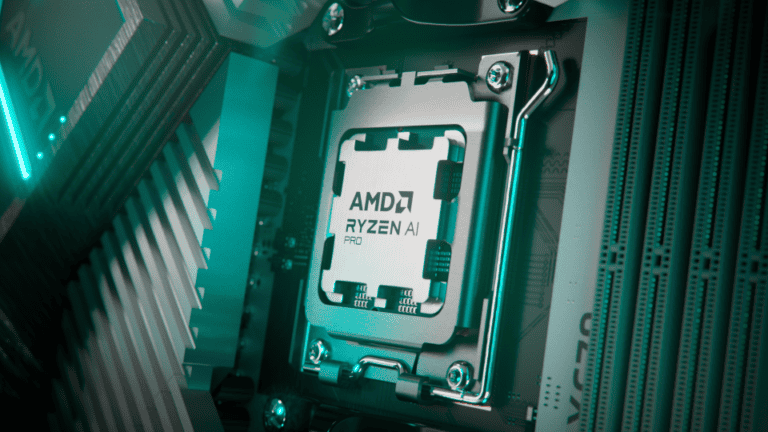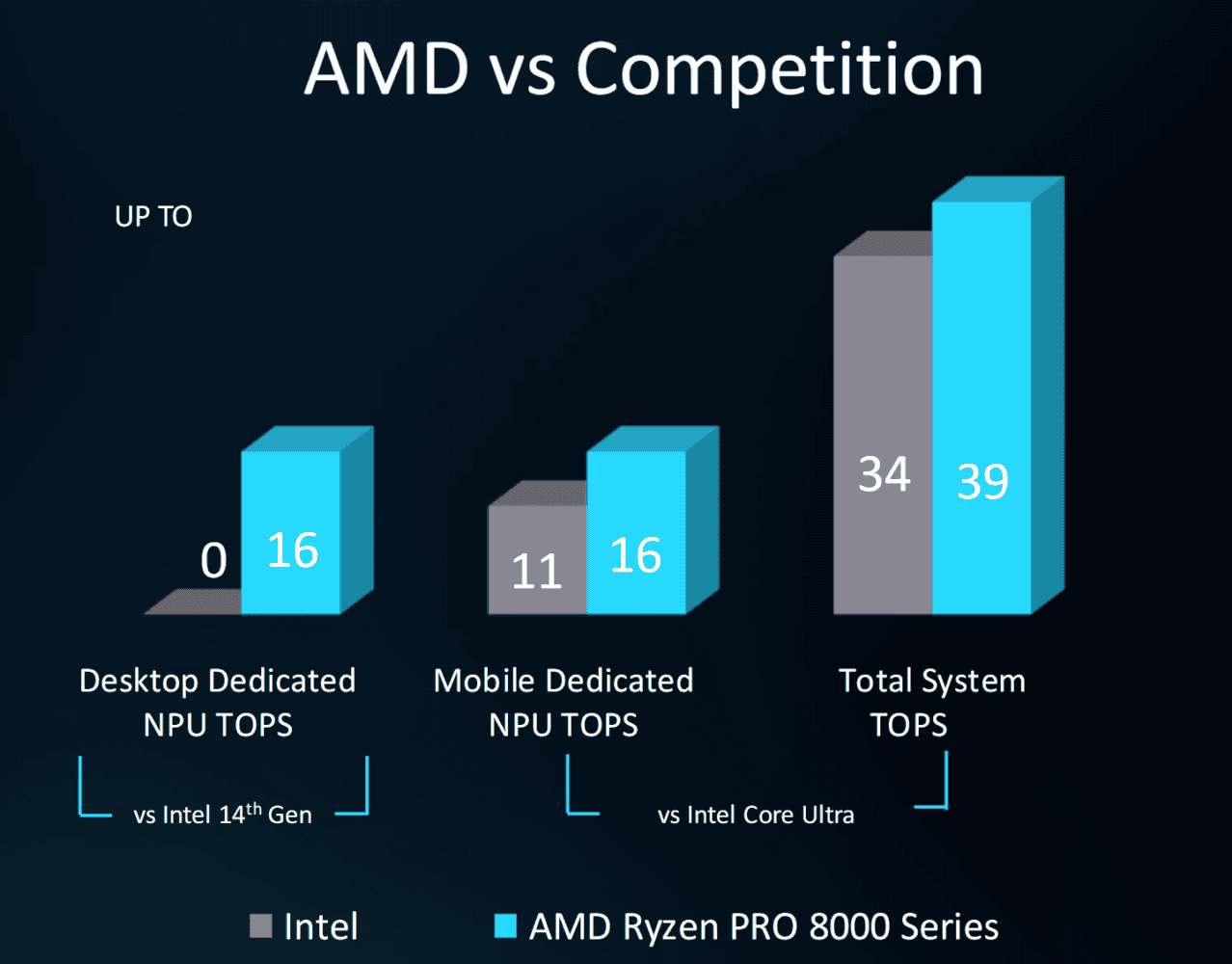Both Intel and AMD have recently released chips that accelerate AI workloads. With the latest Ryzen Pro 8000 CPUs for laptops and desktops, AMD claims it has gained a significant lead. In addition, business users benefit from better management features and higher efficiency.
According to AMD, the criteria for PC purchases have changed. Whereas before the pandemic users were mostly interested in CPU performance, graphics and security, during Covid-19 this shifted to collaboration capabilities, portability and PC management. Now a new era has arrived: that of AI PCs. The unique selling points revolve around a personalized experience, increased productivity and enhanced privacy. All of this should be made possible by running generative AI solutions locally, which can achieve everything from chatbots to optimal battery life.
The chip company also notes plenty of enthusiasm for AI PCs. Both large enterprises and SMBs are ready to adopt AI, and quickly. 59 percent of enterprise customers, for example, would like to be an early adopter of AI PCs, while IDC predicts that 60 percent of all PC purchases will involve an AI PC by 2027.
The “only pervasive AI portfolio”
AMD emphasized during the announcement of the new Ryzen Pro 8000 chips that it is the only party to enable AI acceleration everywhere, from data centres and edge to the client. Intel cannot yet match this “pervasive AI portfolio” because it does not yet have a desktop processor with an NPU. The new AMD chips power AI-assisted laptops and desktops, with TOPS (Tensor Operations per Second) as a crucial metric. This number essentially shows how powerful a hardware product’s AI capabilities are.
These TOPS usually consist of a sum of the AI power provided by the CPU, NPU (Neural Processing Unit) and GPU. The magic number here is 40 TOPS, which Microsoft sees as the minimum for impressive AI performance. AMD comes closest to that in its own benchmarks, while on desktop, it faces no Intel equivalent. Arrow Lake, the next generation of Intel desktop chips, should change that. Either way, we are not there yet with the desired AI computing power if we simply use Microsoft’s definition. Mind you, any user with a reasonably powerful GPU will beat the TOPS performance of these efficient AI chips.
Efficiency leap
Efficiency, then, is the magic word for these new Pro chips. The well-known Zen 4 architecture (previously used in Ryzen 7000) has been shifted from TSMC’s 5-nanometer process to 4 nanometers for these new chips. This explains why these CPUs can perform similarly to before with much lower consumption. On laptops, AMD’s own Ryzen Pro 8840U achieves better performance at 15W than the Intel Core Ultra offering, which consumes as much as 28W with the 165H and 155H. Within the Office suite, the performance gain over Intel is significant: in every benchmark, the 8840U achieves between 67 and 76 percent better benchmark figures.
AMD has no logical comparison to Intel on business desktops, but even there, Ryzen AI (this is what AMD calls its own NPUs) is present in various forms. Not all Ryzen Pro 8000 chips actually contain these NPUs (see *). The variants with an E count as more efficient options with a small performance penalty over the regular versions.
| Model name | Cores | Threads | Boost freq. (GHz) | Base freq. (GHz) | TDP (W) |
| Ryzen 7 Pro 8700G | 8 | 16 | 5.1 | 4.2 | 45-65 |
| Ryzen 7 Pro 8700GE | 8 | 16 | 5.1 | 3.65 | 35 |
| Ryzen 5 Pro 8600G | 6 | 12 | 5.0 | 4.35 | 45-65 |
| Ryzen 5 Pro 8600GE | 6 | 12 | 5.0 | 3.9 | 35 |
| Ryzen 5 Pro 8500G* | 6 | 12 | 5.0 | 3.55 | 45-65 |
| Ryzen 5 Pro 8500GE* | 6 | 12 | 5.0 | 3.4 | 35 |
| Ryzen 3 Pro 8300G* | 4 | 8 | 4.9 | 3.45 | 45-65 |
| Ryzen 3 Pro 8300GE* | 4 | 8 | 4.9 | 3.5 | 35 |
Wi-Fi, BlueTooth and security
Connectivity in the Ryzen Pro 8000 series features an upgrade over its predecessors. Wi-Fi 7 and BlueTooth 5.4 is now natively supported. Furthermore, AMD emphasizes it is taking security management to the next level through AMD Pro Technologies. The company believes that businesses are cheaper with AMD’s offerings than Intel, partly because the security tools are the same for all AMD Ryzen-based PCs.
AMD’s announcements show that while AI may initially dominate, significant progress is also being made on other fronts. For end users, efficiency will be a more significant argument for switching to systems with the new Ryzen chips. For now, AMD only cites HP and Lenovo as OEMs that will offer the CPUs in laptops and desktops.
Also read: Intel and Nvidia have radically different visions for AI development

